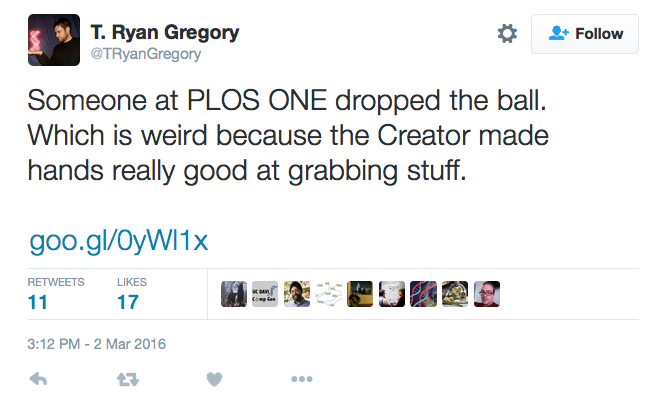Oops!
PLOS One published a paper in January with the title “Biomechanical Characteristics of Hand Coordination in Grasping Activities of Daily Living“. And the abstract contains this line:
The explicit functional link indicates that the biomechanical characteristic of tendinous connective architecture between muscles and articulations is the proper design by the Creator to perform a multitude of daily tasks in a comfortable way.
The main text contains two more references to “the Creator”. The Introduction notes that
Hand coordination should indicate the mystery of the Creator’s invention.
And the end of the Discussion:
In conclusion, our study can improve the understanding of the human hand and confirm that the mechanical architecture is the proper design by the Creator for dexterous performance of numerous functions following the evolutionary remodeling of the ancestral hand for millions of years.
Today, someone seems to have noticed this “Creator” stuff and brought it to the attention of the journal, which issued a statement that they’re looking into it.
So what happened?
This does not read to me like it is part of some sort of conspiracy to infiltrate the biology literature with intelligent design propaganda. However, it is a good illustration of the issue with the PLOS One model as it is implemented in practice.
PLOS One is based on an interesting idea. The papers are peer-reviewed, but evaluation is explicitly supposed to focus on technical accuracy, ignoring “impact”. This was a brilliant idea. Historically limited space (in print) and a pathological pursuit of citation metrics means that lots of good science has a hard time getting published, either because it is not flashy enough, or because journals are reluctant to publish things that do not fit squarely in the domain of what they imagine their readers’ interests to be.
In a sense, PLOS One aims to split the difference between traditional publishing and the preprint / post-pub-peer-review model. It is someplace where you can publish interdisciplinary work, weird little fun studies, negative results, etc. But in principle you get the benefit of knowing that the work itself has been vetted.
Or at least as vetted as you ever get with peer review, which is to say, imperfectly and highly variably.
As a result, PLOS One publishes lots of cool stuff, and it provides a valuable service to the community. But when something like this happens, it makes it seem like the editorial policy in practice is something more along the lines of “just make sure the check clears”.
